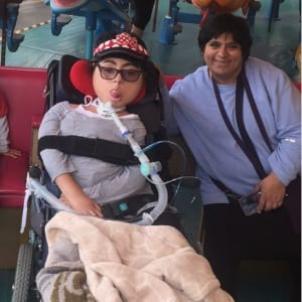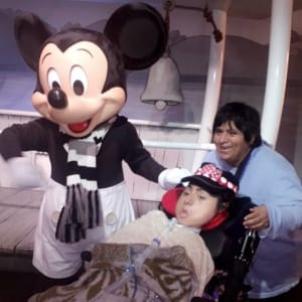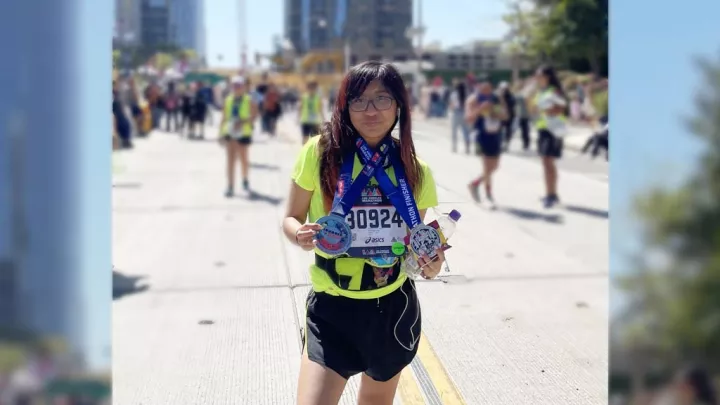
Connie Morales Is Right in Front of You
You have to fight the inclination to ignore Connie Morales. Diminutive, attached to a ventilator and immobile, her eyes sloping off to the side, she lies back in a wheelchair in such a way that she is often taken for a small child in a stroller—and you find yourself treating her as such. Her voice is thin, more air than sound, the product of her diseased lung muscles.
But spend just minutes around her and you start to catch on. You stop looking to her nurse or her mother and you make the effort to hear her, because in that same small space of time you also learn that she demands better from you without ever asking for it. No, she will not be ignored. She will not be condescended to, diminished or marginalized. She will not be not seen.
She will be forgiving, though. If you’re guilty of any of these slights, she’ll say cheerfully, “No worries!” as you do some hasty course correction.

That’s a lot to wrestle with in one introductory conversation, but Connie Morales leaves a mark. She’s an undergraduate at Whittier College, a small liberal arts school in Southern California, a distinction shared at current count by 1,601 other people. However, she can accurately say that she’s the only one, past or present, ever bound to a ventilator. The ventilator passes oxygen through a tracheostomy tube installed in her windpipe, and then on into her lungs. She has a gastronomy tube for eating; a catheter that suctions out mucus buildup; a device that helps her cough to clear her airway; and yet another piece that humidifies the air delivered from the ventilator to keep the tracheostomy tube from clogging and suffocating her.
Having just passed her 20th birthday, Connie has been much this way since age 3, when she was diagnosed with mitochondria myopathy, a congenital muscle-wasting disorder that has taken virtually all of her movement. The disease presented in the form of a fever and respiratory trouble. “She just got sick one day,” her mother, Evelyn Morales, says.
Her symptoms were worsening when a walk home from day care turned into an emergency visit to Children’s Hospital Los Angeles. “As we were walking, I noticed that her body just went limp,” Evelyn says. “I had to call 911.”
A comprehensive workup pointed toward a prevailing, underlying myopathy.
“We knew she had some disease that was probably inherited and that was affecting her muscles,” says CHLA pediatrician, Sajjad A. Yacoob, MD, the attending physician who received Connie’s case the day she was admitted. “And we knew she could not survive without being on a ventilator.”
But Connie was able to demonstrate that her cognitive functions were unaffected. “She knew what was going on,” Yacoob says. “She just didn’t have the motor skills. Her ability to vocalize or do anything was not there.”
The decisive test was a muscle biopsy, which identified the myopathy and would mark the beginning of Connie’s years of ongoing care at CHLA. Her lineup of doctors starts with Yacoob and includes an otolaryngologist to watch over her tracheostomy, a pulmonologist for the ventilator and an orthopedist for scoliosis. There’s also a quartet of private nurses running day and night shifts.
The anchor of Connie’s care, however, is Evelyn. Nurses clock in and out, and there’s turnover, but Evelyn stays. “Evie’s shift doesn’t end,” says Angelina Flores, Connie’s day nurse.
As a result, Evelyn and Connie have a byplay one would expect of a mother and daughter who spend too much time together—a minefield of eye rolls, quick triggers, and little abrasions that have yet to seal up. Connie’s annoyed sighs are answered by her mother’s sheepish alibis.
Witness their exchange over a contentious memory from Connie’s first day in high school, when Evelyn made the dubious move of engaging a boy who, like Connie, was in a wheelchair with a ventilator and a tracheostomy. “He was exactly like my daughter,” she says.
Evelyn can hardly tell the story as Connie carps at her in the background, still irritated by the incident. It seems that Evelyn approached the boy, soliciting him as Connie’s potential date to the junior prom.
“I did, I did,” she says, sinking into her chair. “I did because this was my daughter. She’d never been to a dance.”
The date was made—and, Connie says gently, did not go well.
“I’ll never live that down,” Evelyn says.
There have been better starts to high school, but it was a start nonetheless. Evelyn had attempted to place Connie in elementary school years earlier, but she landed with an intolerant, uncooperative teacher who decided Connie wasn’t up to learning and largely ignored her.
Evelyn withdrew her and kept Connie homeschooled by a teacher provided by the local school district in Baldwin Park. After she completed 10th grade, the teacher retired, and advised Evelyn to enroll Connie in a mainstream public school.
“She needed something more, something bigger,” Evelyn says. “She needed friends.”
The high school had a large population of students with disabilities, so it wasn’t thrown by Connie’s presence. The only accommodations made were logistical. She was accompanied by a nurse and a professional transcriber, who took notes for her and spoke on her behalf in the classroom.
Academically, she didn’t shrink from taking the most rigorous courses, including AP classes. She also wrote for the school newspaper. “I worked harder,” Connie says, “because I felt like other people didn’t think I was capable.”
She blew up that notion, graduating last June with honors, a 3.7 GPA—and a plate of college acceptance letters. She turned down University of California, Riverside, and UC San Diego in favor of Whittier College, which offered a scholarship. Upon entering as a freshman in August, she achieved two firsts, becoming the first person to attend the school on a ventilator and the first member of her family to go to college.
She gets through her coursework much as she did in high school. In place of a dedicated transcriber, she has the help of students who copy off their lecture notes and leave them for her. Flores, her day nurse, takes her to class.
“If there’s an open discussion and Connie wants to say something, she’ll tell me and I’ll raise my hand,” she says. “She’s not shy.”
Evelyn fills every role, backing up Flores in the classroom, typing out Connie’s essays, or turning pages for her as she reads in the evening. Connie’s father subs in a couple of nights a week, though with substantially more labor involved. He speaks only Spanish, so Connie dictates her work to him letter by letter, spelling out each word, indicating when to insert punctuation.
It’s a strenuous, difficult arrangement. She lives on campus during the week, in a tiny dorm room that has to fit her mother, a nurse and all the apparatus that keeps her breathing. Not every course is viable. Connie had to drop a photography class because using her mother as a surrogate photographer wasn’t working.
“I don’t know anything about cameras except my phone,” Evelyn says. “I know how to use the phone.”
“It did not work,” Connie says conclusively.
But for the most part, it has worked. She ended her first semester with straight A’s, and is a staff writer for the campus newspaper. As she goes, she continues reversing the snap judgments made about her abilities.
“The first day we went to class,” Evelyn says, “her English teacher was shocked because he didn’t know he had a student like my daughter.”
It turns out he didn’t, but not in the way he figured. “He didn’t think he could teach her,” Flores says. “Now he’s always bringing up Connie’s work.”
When her grades started to come back, Connie added another I-told-you-so to the pile: “I was like, ‘Haha!’”
But he’s not the one who motivates her. It’s the elementary school teacher who has driven Connie all this time, the one who wrote her off on appearance only. She speaks in general terms, but that insult has lingered.
“Some people automatically assume I’m not capable as soon as they see me,” she says. “They don’t really get to know me. I don’t get mad because I understand. They don’t know.”
What’s worse is the unwanted pity of strangers. “People always look at me when I’m at the mall or at the park—like, ‘Hi, little baby.’ Or ‘Poor girl.’ It kind of annoys me, even though people are trying to be nice.”

She doesn’t answer them, nor does her mother. “Connie doesn’t let me say anything,” Evelyn says.
She says she has no memories of herself before her disease set in, but she has imagined her life without it. “I’ve had a few different dreams when I’m walking and everybody looks at me as normal.”
But the dream hasn’t returned for some time. She’s engaged in the life she has, planning to major in English with designs on a career as a journalist. She has “this incredible ability to continue and persevere,” Yacoob says. “Things that you’d expect—depression, desire not to interact—they’re not there with Connie.”
She even keeps a sense of humor about her condition. Asked if she can move at all, she flexes her hands.
“That’s all I got,” she says. “Oh, I also got this,” she adds quickly, twitching her eyebrows, before heading off to show she’s got plenty more than that to anyone who presumes otherwise.


